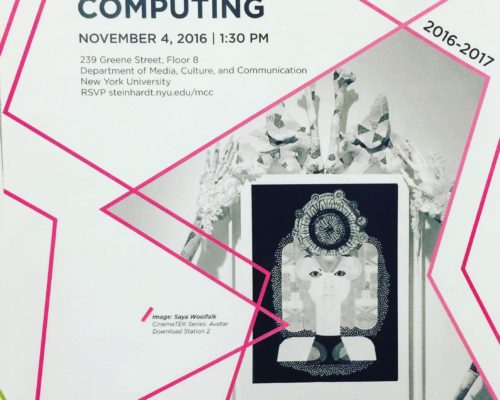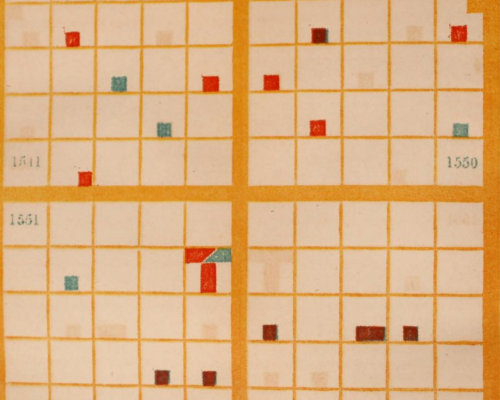On Tuesday, February 7, Shawn Hill taught a workshop entitled “Introduction to Scalar” at Fordham University’s Lincoln Center campus. Scalar is an interactive online publishing platform that allows authors to develop several paths of reading for their users. This platform offers new methods of publishing information, no longer limited to a single, linear reading but instead open to forks in…
Category: Resources
Machine Learning: A Primer: A DH Review
Machine Learning: A Primer Speaker: Achim Koh CUNY Graduate Center Today, many critics push to make our algorithmic world transparent, to remove the cover on “black box” machines and expose and deconstruct the systems by which these computers run. The scope of this feat, itself, appears daunting, algorithms lain in dense webs and expressed in arcane and protected jargon, yet…
Skillshare: .CSV to MySQL database
[vimeo 195745074 w=640 h=400] .CSV to MySQL import from John on Vimeo. Link to GitHub Repository This video demonstrates the process of formatting a .csv file, with data in it, for proper insert into a MySql database. The tools needed to carry out this process ars: A free copy of libreoffice (we will be using “Calc”). A free copy of…
Visualizing Poetry: Multivariate Data Analysis with Poem Viewer
[vimeo 195401136 w=640 h=360] Introduction to Poem Viewer Poem Viewer was developed by a multidisciplinary team of computer scientist, linguist, poets, and literary scholars at the University of Oxford and the University of Utah under the Digging into Data Challenge. It is an in browser tool that supports close reading through multivariate data analysis. Users are able to visualize, interact…
Event Review: Brooklyn Public Library Volunteer Seminar
On Thursday December 1st, members from the Brooklyn Public library introduced a group of interested Pratt LIS students to the prison library programs in NYC. Nick Franklin from the Brooklyn Public Library (BPL) discussed the services he and others help to provide to Rikers Island prison system, including visitation with circulating materials, reader advisory, reference services, and a video call…
Publishing Art History Digitally: The Present and the Future
In October, the Institute of Fine Arts at New York University brought together art historians, non-profit professionals and art publishers for a symposium not only on the new phenomena of publishing traditional art historical scholarship online, but on how it relates to publishing digital humanities in art history online. Organized by the online art journal, Nineteenth-Century Art Worldwide and funded…
Research Without Borders At Columbia University. Effecting Change in Scholarly Communication: Opportunities and Costs
Abstract: Columbia University Libraries hosted a Research Without Borders Event November 21. The event focused around scholarly publishing. The speakers spoke about alternatives to traditional methods of publishing and alternatives to open source with a focus on the economy of publishing. A running theme during the event was re imagining traditional methods to publishing and open source and how authors…
“Conditions of (In)Visibility: Cultivating a Documentary Impulse in the Digital Humanities,” Keynote address by Roxanne Shirazi at Florida State University Library’s Invisible Work in the Digital Humanities Symposium, November 18th, 2016
Abstract: On November 18th, 2016, Roxanne Shirazi delivered a keynote address at Florida State University Libraries’ symposium on Invisible Work in the Digital Humanities. Her presentation, titled “Conditions of (In)Visibility: Cultivating a Documentary Impulse in the Digital Humanities,” addressed the way that focus on a final product, rather than an iterative process, obscures the labor and laborers necessary to create…
Protected: Decolonial Computing: Histories and Futures
There is no excerpt because this is a protected post.
“The Shape of History: Reimagine 19th Century Data Visualization” by Lauren Klein at Columbia University
Professor Lauren Klein of Georgia Institute of Technology conducted a talk on “The Shape of History: Reimagine 19th Century Data Visualization.” In her lecture she examines the history of data visualization through various visualization pioneers such as Elizabeth Peabody (1804-1894), William Playfair (1759-1832), Emma Willard, and Joseph Priestley. Professor Lauren Klein aimed to demonstrate the relevance of data visualization in a historical sense in today’s visualizations. Klein also discusses her own personal works with Elizabeth P. Peabody’s mural charts and the advances within her project.

